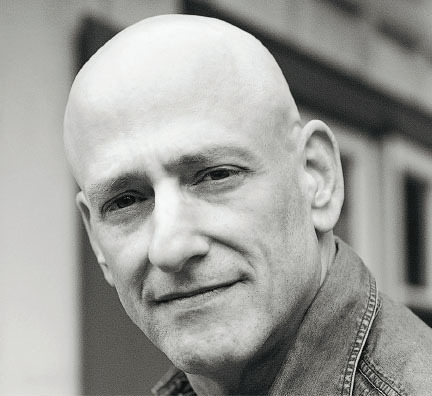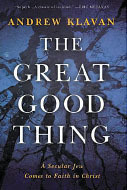A new classic in spiritual autobiography
Last summer I began to plan a book on the truth of Christianity. On the lookout for new authors, I stumbled across Andrew Klavan’s autobiography The Great Good Thing (Thomas Nelson, 2016). I would’ve bypassed it except for the subtitle: "A secular Jew comes to faith in Christ."
Eric Metaxas, the well-known Christian writer, states that The Great Good Thing "deserves to become a classic" in apologetics and spiritual autobiography. I agree.
Klavan’s tremendous writing ability (shown in literary awards) is enhanced by wide reading and penetrating analysis. He offers profound insights into his secular Jewish upbringing, temporary forays into Freudian ideology and Zen Buddhism, and descent into depression and contemplation of suicide.
The great good thing is his turning to God and trust in Jesus, a miraculous spiritual journey to baptism at an Episcopal church in Manhattan and beyond.
Few Jews, secular or religious, are attracted to Christian faith. This disinterest comes in part from longstanding persecution of Jews, culminating in the Holocaust, and deep-seated belief that to become a Christian is a betrayal of Jewish identity.
Klavan initially rebelled against participating in Jewish ritual because he, like his mother, was an atheist. "Subtract the Almighty and what was the purpose of it? It was just an empty temple, its foundations resting on nothing, its spires pointing only toward the dark."
What led this secular Jew to God, despite his abusive father and neglectful mother? The answer is manifold. First, his earliest positive Christian memories came from a Yugoslavian woman named Mina who helped in Klavan’s home.
 Andrew Klavan. PHOTO: HARPERCOLLINS
Andrew Klavan. PHOTO: HARPERCOLLINS
NAME: ANDREW KLAVAN
OCCUPATION: AUTHOR, SCREENWRITER, SOCIAL CRITIC
BIRTH: JULY 13, 1954 (GREAT NECK, LONG ISLAND, N.Y.)
RESIDENCE: SANTA BARBARA, CALIF.
FAMILY: MARRIED TO ELLEN FLANAGAN, TWO ADULT CHILDREN
ETHNICITY: JEWISH
RELIGION: CHRISTIAN

Second, Klavan came to Jesus through his love of literature. Even as a young boy with no belief in God, he "began to understand that at the heart of all Western mythology, all Western civilization, all Western writing, all Western thought, and every Western ideal, there stood a single book, the Bible, and a single man, Jesus of Nazareth."
Third, Klavan’s conversion story amplifies the power of prayer. He risked talking to God, not sure if anyone was listening, and kept praying as God became real and Jesus became Saviour. He came to see prayer is best anchored in self-awareness and honesty, while taking notice of our ability to fool ourselves in prayer.
He writes, "The human heart is so steeped in self-deception that it can easily outrun its own lies. It can use even meticulous honesty as a form of dishonesty, a way of saying to God, ‘Look how honest I am.’ So I let it go. I let it all go. I just flung wide the gates to the sorry junkyard of my soul and let God have a good look at the whole rubble-strewn wreck of it. Then I went ahead and told him my thoughts as plainly as I knew how."
Last, before his baptism Klavan had to wrestle with the historicity of Jesus’ miracles, death and resurrection. In time he came to believe that the "great good thing" about Jesus was more than a myth or story. There was an empty tomb.
Thankfully, Klavan has experienced little attack for his faith. This is not true of all Jews who have become disciples of Jesus.
Consider Rabbi Jeff Forman. He was raised in the conservative Jewish world of northeast Philadelphia. His introduction to the Messiah came through his sister’s coming to faith, then his mother’s. At their Messianic Jewish congregation, he prepared for the rabbinate and served in its leadership for a decade, then accepted a call in 1995 to pioneer another such Messianic congregation in Toronto.
However, that congregation became the target of a broad and aggressive campaign from the Jewish community against their presence. Things eventually quieted down, but Forman had to have bodyguards for quite a period.
There is a common thread in the life stories of Klavan and Forman. They have both found deep joy in their turn to Jesus. This, of course, brings to mind the conversion narrative of C. S. Lewis. His autobiography is called Surprised by Joy.
All three Christians, two Jews and one Gentile, are proof that biographies conversion to Christ are often the best signs of the truth of Christian faith.

Professor Beverley invites Christian readers to contribute conversion stories and reasons for faith in Christ for his new book.(JamesBeverley@Sympatico.ca). Read more of his columns at www.FaithToday.ca/ReligionWatch.